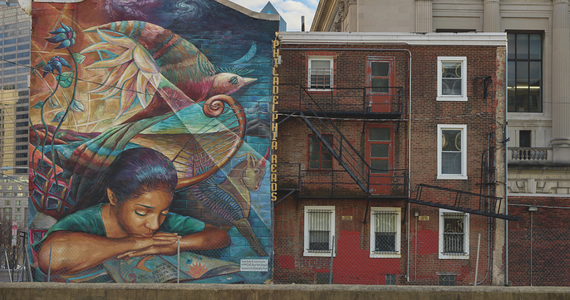Our Histories, Our Health, Our Collective Future
Posted on
September 26, 2022
 Mural by Joshua Sarantitis at Callowhill St. and N. 19th
Mural by Joshua Sarantitis at Callowhill St. and N. 19th
By Dean Ana V. Diez Roux, MD, PhD, MPH
I am a big believer in the power of numbers and data, when clearly and simply presented, to illuminate understanding and motivate social action. This is probably why I became an epidemiologist. But I am also a big believer in the power of stories and narrative. This may stem from having been an avid reader of fiction my whole life and from experiencing how words in poetry, in short stories, in novels, can so elegantly capture the essence of the human condition, of life, of injustice, of the possibility of change.
Sometimes it has been hard to connect these two parts of my life: science and epidemiology with language and storytelling. Perhaps this is a good thing, as fiction has often been a refuge to me. When I read a book on the couch on a Sunday afternoon, I am a teenager back in Buenos Aires again, reading away the summers voraciously from Garcia Marquez to Tolstoy, my whole life ahead of me and full of possibility. Everything else melts away: I am in the moment and a new and different life opens before me.
This summer however these two worlds, my public health world and my storytelling world, came together in ways that I had not experienced before. And this has to do with two books I read. In truth they are not works of fiction: one is narrative non-fiction and the other is a memoir. But they are both so beautifully told and so beautifully written that they are as captivating as any work of fiction. In “The Warmth of Other Suns” Isabel Wilkerson weaves together the three moving stories of Ida Mae Gladney, George Starling, and Robert Foster, all of whom participated in the “great migration” that occurred between 1915 and 1970 in the United States in which it is estimated that as many as 6 million African Americans migrated across the country in search of better lives. In “My Broken Language,” Quiara Alegrai Hudes tells the story of her immigrant family (and of her own emergence as an artist) living between Puerto Rico and Philadelphia in the 1980s and 90s, how they struggled with poverty, AIDS and substance use, and how culture and music and art were sources of comfort and power. The two books are written in very different styles and tell very different stories, but both are moving in their depiction of the determination to persevere in the face of stark injustice, in how they illustrate the resilience and power that can emerge even in the face of great adversity, in how they reveal what it means to be human.
Both books illustrate vividly and beautifully how history and society shape our lives and of course our health in ways that cannot be documented by numbers alone. For me, they both illustrated how narrative can give power and nuance to numbers, how it can illuminate, move, and cause us to reflect on causes and their implications in ways that yield new insight and new urgency to act. But beyond how these stories help us understand what drives population health, both books also reminded me of how much we each carry hidden with us inside, how much the history of our families large and small, stretching back in time over generations we carry with us. They reminded me of how much this history shapes who we are. And yet how little we often know about each other, how this personal history remains hidden and something we leave at the door when we come to learn or work.
As you will read in the latest Dean's monthly newsletter, this academic year we are thrilled to welcome many new faculty, students and professional staff to our school. They each bring their own life history, the history of their family’s generations past, their beliefs, their hopes, and their full humanity. May we all (new and old!) be able to share these stories with each other and find time to reflect on how we are both different and similar, on our shared humanity, and on how our histories shape and contribute to our mission and our work together. We need this not just for our work in public health, but to create a more just, fulfilling, and sustainable collective future for all of us. Welcome to all, whether you are new to Dornsife or have been here a long time, I look forward to hearing and learning from all your stories.